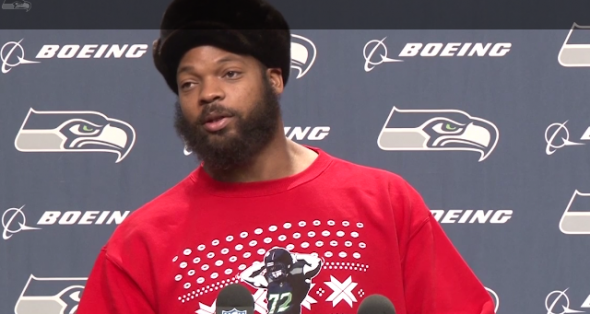
Disputing Michael Bennett’s account of his detainment, Las Vegas police said Thursday that, after reviewing more than 800 videos, they treated him “appropriately and professionally” when he ran from an after-hours club as officers searched for an active shooter that they later determined didn’t exist.
At an afternoon news conference, Clark County Sheriff Joe Lombardo said his officers did nothing wrong when Bennett, after attending the Floyd Mayweather-Conor McGregor fight Aug. 26, was held for 10 minutes before being released with no charges filed.
But none of the video was from the officer who detained Bennett, because his body camera was turned off. Nor did police identify the three officers who encountered him, one of whom can be seen on video holding a gun to the head of Bennett, who was prone on Las Vegas Boulevard and handcuffed.
Bennett claimed the officer threatened him: “I’ll blow your fucking head off.”
The sheriff said, “From the evidence we have at this point, we don’t know (the officer) said that.”
Bennett posted to his Twitter account Sept. 6 his version of events that included his contention that he was racially profiled by police and that his treatment was “unbearable.”
Lombardo emphasized that Bennett was engaged in no criminal activity.
“Mr. Bennett has a valid perspective as a person who experienced a reasonable-suspicion stop for a felony crime,” Lombardo said. “Those who experience such a stop, especially when they have not committed a crime, are not likely to feel good about it.”
Lombardo used a stop-motion narrative of casino surveillance video showing Bennett appear to dart behind a row of slot machines, and then body camera video from a sergeant joining the chase when officers noticed him running. Video of the Lombardo press conference can be seen here.
Lombardo said that the reports of gunfire were mistaken, and that the noise came from heavy velvet-rope stanchions that were knocked to a tile floor after an unrelated fight between patrons broke out near where Bennett entered the club.
Bennett’s attorney, John Burris of Oakland, said he wants to review videos more closely. But he said he believed the clips shown verified Bennett’s accounts.
“He was not acting improperly,” Burris told The Associated Press. “He was not acting suspicious. He was not involved in any criminal activity.
“There’s nothing to go on, no description, other than you see this big black man running. He was running like everyone else, trying to get away.”
Burris said the officer’s gun was near Bennett’s while he was being handcuffed, and he said he heard profanity in audio recordings captured on body-camera video. Burris said he heard no reference to race.
Bennett said he was considering legal action for a violation of his civil rights, but said Wednesday there were no developments to disclose.

5 Comments
I can think of at least two questions that the sheriff didn’t answer or that Bennett’s attorney didn’t ask or didn’t have the opportunity to ask:
1. Does the sheriff think that holding a gun to Bennett’s head (shown on video according to the article) is part of the officers’ “appropriate and professional” behavior?
2. Bennett claimed that an officer told him, “I’ll blow your fucking head off.” The sheriff stated, “From the evidence we have at this point, we don’t know (the officer) said that.” Did the sheriff bother to ask the officer in question whether he said that? If so, what was the response? If not, why not?
The main question here is what, if any, steps will Mr. Burris take after he reviews the video further.
Good points. More questions remain. Presumably we were learn more in court proceedings.
Analysis from sports law professor Michael McCann, on what steps both Bennett and the Las Vegas police could take from here: https://www.si.com/nfl/2017/09/29/michael-bennetts-police-altercation-video-legal-las-vegas-nfl
As a person (a white male nonetheless) who has been on the receiving end of unwarranted physical and mental abuse (by police and in a relationship), I am going to side with the victim in this case. De-escalation training in much needed in many areas of life. People get too violent, too fast. When not suddenly going limp and silent and suppressing all instincts for self-preservation (willingly putting your own well-being in jeopardy when you know you are in the right) is considered resistance and worthy of response in the form of a violent display of force against your person, there is a problem.
Doug Baldwin has been an active proponent of more de-escalation training for police. He’s the son of a a retired cop. Baldwin has been on both sides.